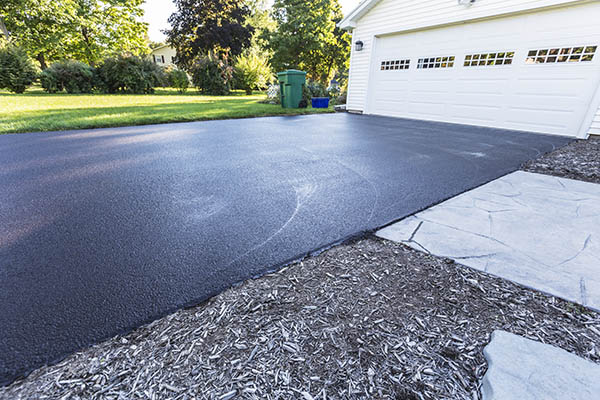Optimize Safety And Security with Angle Parking Lot: Superior Asphalt Sealing
Wiki Article
Cold Mix Asphalt Vs. Hot Mix Asphalt: Which Is Right for You?

Make-up Distinctions
Cold mix and warm mix asphalts differ dramatically in their structure, with distinctive attributes that influence their efficiency and applications. Cold mix asphalt is produced by emulsifying the asphalt binder with water and an emulsifying agent prior to blending it with aggregate. This approach permits the asphalt to be convenient at reduced temperatures, making it optimal for short-term repair work and for use in chillier climate condition. Warm mix asphalt, on the other hand, is made at heats, normally in between 300-350 ° F, which aids to achieve better compaction and a much more resilient end product. The warm mix asphalt production procedure includes warming the accumulation and asphalt binder separately before integrating them at the asphalt plant.
Additionally, cold mix asphalt often tends to be less dense and more versatile than warm mix asphalt. This adaptability makes it much better fit for locations with higher levels of movement, such as driveways or roads with heavy website traffic. In contrast, warm mix asphalt is recognized for its high longevity and resistance to rutting and breaking, making it a recommended option for freeways and high-traffic roadways where longevity is important.
Installment Refine Variances
The process of mounting cold mix and hot mix asphalt shows notable variances in their demands and procedures. In comparison, hot mix asphalt demands a much more fancy setup procedure. Due to the home heating needs, hot mix asphalt setups are commonly lugged out by specialists with specialized tools, guaranteeing a more irreversible and structurally audio result.Longevity and Longevity Elements
When taking into consideration asphalt alternatives, durability and longevity are crucial variables to evaluate for enduring pavement performance. Warm mix asphalt (HMA) is recognized for its phenomenal longevity and longevity. The heats throughout the laying and blending process enable for better compaction, causing a denser and stronger pavement framework. This brings about HMA being extra immune to rush hour loads, severe weather, and the effects old contrasted to cold mix asphalt (CMA)
In terms of longevity, HMA generally surpasses CMA as a result of its remarkable strength and resistance residential properties. HMA sidewalks have a longer service life, calling for less frequent repair services and maintenance, Going Here which can translate to set you back savings in the long run. Additionally, HMA pavements are extra quickly adjustable to meet particular project demands, better boosting their longevity.
Price Factors To Consider
Thinking about the economic ramifications is an essential aspect when examining the selection between hot mix asphalt (HMA) and cold mix asphalt (CMA) for pavement jobs. While the initial cost of warm mix asphalt is commonly greater than that of cold mix asphalt, HMA often gives an extra cost-efficient option in the lengthy run as a result of its exceptional longevity and long life. HMA is recognized for its capacity to stand up to rush hour lots and rough weather, decreasing the demand for constant repair services and upkeep. On the other hand, chilly mix asphalt is a lot more budget-friendly ahead of time yet might learn this here now require even more constant patching and resurfacing, resulting in greater upkeep costs with time.Along with material prices, it's necessary to take into consideration the expenditures connected with installation and maintenance when contrasting HMA and CMA. HMA usually requires specialized tools and knowledgeable labor for proper setup, which can affect total task costs. Alternatively, CMA is easier to function with and can typically be used utilizing easier strategies, possibly reducing setup expenses. Inevitably, the choice in between HMA and CMA need to consider not just the preliminary cost however also the lasting economic effects to establish one of the most cost-effective choice for the particular pavement project.
Environmental Influence Contrast
Contrast of the environmental impacts between hot mix asphalt (HMA) and chilly mix asphalt (CMA) exposes unique distinctions in sustainability methods. HMA production calls for high temperatures, leading to enhanced power usage and greenhouse gas exhausts.Moreover, the use of CMA often involves recycling existing asphalt pavement, advertising resource preservation and lowering the quantity of waste sent out to land fills. By deciding for CMA over HMA, roadway building and construction tasks can add positively to ecological preservation efforts.
Final Thought
Finally, the option between cold mix asphalt (CMA) and hot mix asphalt (HMA) depends upon different variables such as composition, installment procedure, sturdiness, longevity, price, and ecological effect. asphalt repair. While CMA provides a cost-efficient and quick solution for small repair work, HMA guarantees remarkable longevity and durability for rush hour locations. Consider these variables very carefully to identify which sort of asphalt is the appropriate choice for your paving needs

Taking into consideration the monetary effects is an important aspect when reviewing the option in between warm mix asphalt (HMA) and cold mix asphalt (CMA) for sidewalk tasks. While the initial cost of warm mix asphalt is my review here typically greater than that of cool mix asphalt, HMA usually offers a much more cost-effective remedy in the long run due to its superior resilience and longevity. asphalt patch repair.Contrast of the ecological effects between warm mix asphalt (HMA) and cool mix asphalt (CMA) reveals distinct distinctions in sustainability techniques.In final thought, the choice in between chilly mix asphalt (CMA) and hot mix asphalt (HMA) depends on numerous variables such as composition, installation procedure, sturdiness, long life, cost, and ecological effect
Report this wiki page